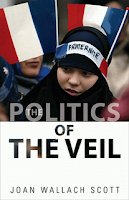Book Of Note
 With the Hijab, the Niqab and the Burqah receiving so much attention of late and in recent years, few or maybe no other book, is as absorbing and eyeopening to read about the aversion in the West, especially in France, to the the 'veil' - as Joan Wallach Scott's 'The Politics of the Veil'. Masterfully and skillfully written, since it being published about three years ago, it has received intense attention and much critique - to the annoyance of the French.
With the Hijab, the Niqab and the Burqah receiving so much attention of late and in recent years, few or maybe no other book, is as absorbing and eyeopening to read about the aversion in the West, especially in France, to the the 'veil' - as Joan Wallach Scott's 'The Politics of the Veil'. Masterfully and skillfully written, since it being published about three years ago, it has received intense attention and much critique - to the annoyance of the French.A few excerpts of what has been said about the book:
- In 2004, the French government instituted a ban on the wearing of "conspicuous signs" of religious affiliation in public schools. Though the ban applies to everyone, it is aimed at Muslim girls wearing headscarves. Proponents of the law insist it upholds France's values of secular liberalism and regard the headscarf as symbolic of Islam's resistance to modernity. The Politics of the Veil is an explosive refutation of this view, one that bears important implications for us all...............Scott maintains that the law, far from reconciling religious and ethnic differences, only exacerbates them. She shows how the insistence on homogeneity is no longer feasible for France--or the West in general--and how it creates the very "clash of civilizations" said to be at the root of these tensions. The Politics of the Veil calls for a new vision of community where common ground is found amid our differences, and where the embracing of diversity--not its suppression--is recognized as the best path to social harmony. Princeton University Press
- Joan Wallach Scott's book refutes the view that the 2004 ban on wearing "conspicuous signs" of religious affiliations in public schools in France was to uphold France's liberal secular values and that the headscarf is a symbol of Islam's resistance to modernity. She argues that the ban is symptomatic of France's failure to integrate its former colonial subjects as full citizens. Britannica
- Brilliant, crisp, and cogently argued. Joan W. Scott's novel and trenchant discursive analysis exposes the prejudices of the reductionist French versions of secularism and feminism regarding Islam and French Muslims from North African and Arab origins. The study is illuminating far beyond the French case, as former colonial and/or working subjects struggle for integration and recognition of their difference. Amazon
- In an incisive and searing book, Joan Wallach Scott explores the anxieties and prejudices fueling the French law banning the headscarf in schools and lays bare the issues hidden by the controversy. French republican laïcité or secularism rests on the concept of the universal equality of abstract individuals. Scott shows how the French formulation founders in its inattention to difference and to the presence of groups and how the headscarf prohibition draws on racism and other legacies of France's colonial past. Muslims are called to assimilate even while they are believed to be fundamentally unassimilable, viewed as all alike, permanent "immigrants," even when they are born in France. Project Muse
- The Politics of the Veil offers a cogent critique of policy-makers and their misuse of history in defending an ideal of abstract individualism central to French republican democracy. Above all, however, Scott reveals the racist and sexist underpinnings of a passionately debated legal measure enacted to preserve a mythological vision of French republicanism and laïcité. MR
- In this book, one of the foremost students of France asks why has the head covering worn by millions of Muslim women across the world attracted so much controversy in recent French politics. University Of Missouri

